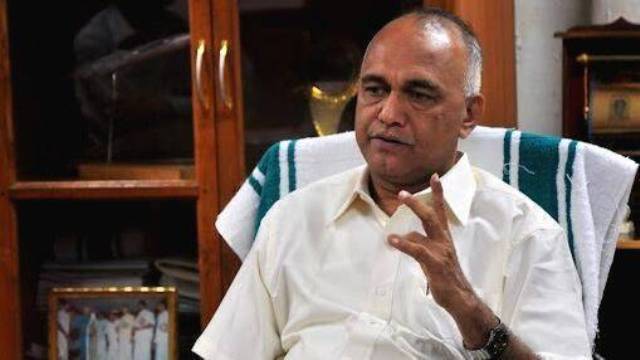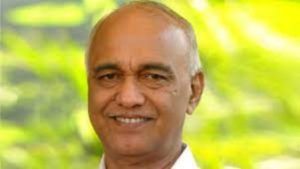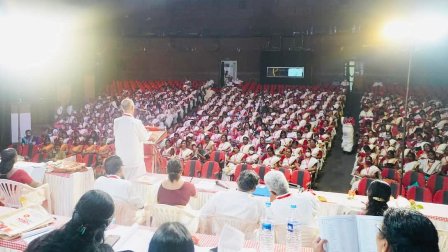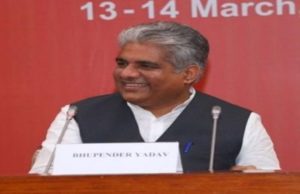

Elamaram Kareem is a veteran Leftist leader in India. Currently, the leader of the Communist Party of India Marxist (CPI-M) bloc in the Upper House of Indian Parliament (Rajya Sabha) Mr Kareem has been the Industry Minister of Kerala from 2006 to 2011. On the trade union front, Kareem is the national secretary of the CITU—the trade union wing of the CPI-M.
In an interview with G. Kalyan Kumar, Editor of BUSINESS VIEWS, Mr Kareem speaks about the various challenges faced by the labour sector in India.
Calling for course corrections in the economic policies Kareem urges a fresh approach to the issues affecting the working class. The veteran asserts that more interventions by the government are imperative to make the economy more inclusive and job-oriented.
Excerpts
What are the major challenges faced by the labour sector in India?
Labour is a critical stakeholder in the nation’s industrial and economic growth. So, it is expected of the government to nurture the strength and potential of this segment positively.
However, the reality is that the labour sector is not getting its due. One reason is the Centre’s unhelpful economic policies on which we are seeking radical changes. The current policy focus has let down the labour sector in terms of new job opportunities and improvement of the existing labour.
From a trade union perspective, we want the government to be more proactive on the problems in the labour sector. The recent move to cut interest rates in EPF is a glaring example of the government’s indifference to the labour class.
Beyond the hype on skill development and cosmetic changes that scratch the surface serious initiatives are yet to come that can address the problems of the workforce.
For us, the term labour is a comprehensive one and we articulate issues of all segments of the workforce including blue-collar, white-collar, and those in the unorganized sector and migrant labour categories.

What is the root cause of the problems on the labour front?
As I said, the crisis in the job or labour sector has a clear linkage with the harmful economic policies that are unsuitable for a country like India.
In what ways do you think the enhancement of the labour sector is possible? Also, please explain the left perspective on the correctives needed in the economic policies?
Serious corrections in the economic policies are required. The current policies are overturning concepts of economic self-reliance. The liberalization and globalization policies kicked off in the early 1990s have lost direction and are more like prescriptions of global capitalist forces.
They dictate terms to emerging economies saying their neo-liberal policies are the way to economic growth and economic freedom. Those following such advice without any discretion or self-check are hurting growth and development.
You are hitting out at the BJP government at the Centre but the Congress government was the real proponent of economic liberalization. So, how justified is the criticism against the Modi government?
Yes, it was the Congress government led by PV Narasimha Rao in which Dr Manmohan Singh was the Finance Minister that rolled out the neo-liberal economic programmes. They included many negative policies like large-scale privatization of public utilities called as disinvestment.
However, the paradox is that the BJP which put up some strong resistance to reckless liberalization at that time through forums like “Swadeshi Jagran Manch” swallowed everything they said when they formed the government in 2014 and brazenly pushed ahead with many neo-liberal policies.
Do you expect any interim packages for the labour sector like slashing of corporate tax periodically?
Reduction in corporate tax rates comes with the defence that it is an incentive for attracting more investments. Similarly, the government must think about introducing suitable mechanisms to boost the labour sector in terms of productivity, working standards, and financial security.

Jobs are a political issue now. How do you analyse that problem?
On the jobs front, the BJP made a big poll promise in 2014 that it would create 2 crores (20 million) new employment every year. Many thought they have a broad policy in mind to achieve that target. But no such policy happened and industrial growth faltered. Regional economic growth became imbalanced and industrial growth continues to skid. This is despite catchy slogans like “Make in India.”
The NSSO (national sample survey) estimates pointed out that the jobless rate in India zoomed to an alarming 45-year high in 2018. It was a wake-up call and the government should have started consultation with all and revisited policy pursuits accentuating unemployment.
What makes job creation important from economic and socio-political perspectives?
Job creation must be a priority for economic growth and good governance. There is no excuse for that. But that is possible only when the government is free from the pulls of the corporate lobby and shows the political will to frame policies with a long-term vision.
The sale of public assets at throw-away prices to private sector giants needs a serious review. The rampant privatization in many industry sectors including banking, telecom, aviation, energy, mining, seaports, retail, airports, railways, insurance, and manufacturing is a matter of concern as it undermines the scope of equitable development.
Public assets are pillars of economic sovereignty and self-reliance. Policies that abet resource erosion need to go. At the same time, we are not against the growth of the private sector.
The Modi government must revisit such policies and factor in the consequences of unbridled privatization on the people and economy. What is required of the government is to preserve strategic public assets under state control and run them professionally.

What are the consequences of diminished job opportunities, underemployment, and neglect of the labour sector on the markets and economy?
I would say we are already experiencing its bad consequences. The purchasing power of the citizens in the domestic market is declining fast and the thousands of businesses depending on rural and urban demand are suffering. It is simple economics that rational wages and employment opportunities will inject money into the markets and make the economy more sustainable than driving money into speculative trading.
How do you assess the changes in the labour sector in India as a trade union leader?
The labour component’s value in the overall production process is shrinking as wages are declining. In the private sector, permanent jobs are down and government sector jobs are vanishing. Outsourcing and contractual jobs are raising the profitability of employers but the job security of the workers is uncertain.
The Covid pandemic exposed the pathetic conditions of migrant labour. But trade unions are yet to mainstream this segment’s misery to bring them under a better social security net. Why?
The migrant labour working in cities is living under stressful conditions. This section needs creative interventions by the national and state governments.
The migrant workers left their villages when agriculture work dried up. Their wages are a fraction of the stipulated minimum wage. Their hardship came to the limelight when the agony of reverse exodus during the Covid lockdown period appeared in the media. The Centre must look at ways to provide better social security and end its apathy on this matter.
The government must act fast on such issues to salvage the country’s prestige in international social rankings as well. India’s rising rankings in the global hunger index have shocked all.
As a former industry minister of Kerala can you describe any initiative on wage-rise that helped any industry to become more competitive?
One example was the wage revision in the state’s tea sector. We wanted to make Kerala’s tea sector more competitive in the national and international markets.

Compared to other states, the wages in Kerala’s tea industry might look high, but the sector’s productivity has been phenomenal. We believe in keeping workers’ morale high to get the best output than forcing agendas of profitability on them.
How do you comment on the charge that trade union militancy has been hampering investment and business climate in Kerala?
During my tenure as Industry minister, the state’s industrial policy has been explicit that the right to hire workers is the sole prerogative of the employer or management. The trade unions have no business in that. There is complete industrial peace in Kerala, and charges of trade union militancy hampering investment are simply baseless.
As a responsible trade union, the CITU also educates workers on the importance of upgrading their skills to keep pace with technological changes to stay ahead.



